Pope's Ireland visit came at difficult time, says Varadkar
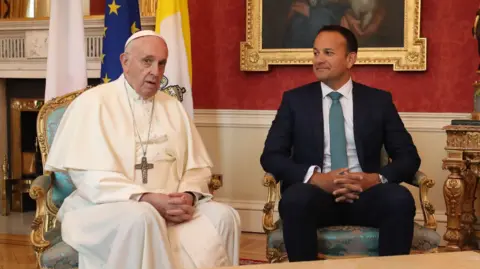 PA Media
PA MediaPope Francis's visit to Ireland in 2018 came at a time when relationships with the Catholic Church were "quite difficult", former Taoiseach (Irish Prime Minister) Leo Varadkar has said.
It was to be the first papal visit to Ireland for 39 years - Mr Varadkar said he was initially "apprehensive" ahead of a meeting with the late pontiff.
"We had just voted to legalise abortion earlier that year, and we'd brought in marriage equality a few years before that," Mr Varadkar said.
"We had a number of years where we were dealing with a number of scandals in relation to child abuse and institutions in relation to mother and baby homes."
However, Mr Varadkar said that he found Pope Francis' approach to be "pastoral first and doctrine second".
During the visit, Pope Francis also met with Mr Varadkar's partner, Matthew Barrett.
"We were one of the first gay head of government couples to meet him and he was very happy to do that," he told BBC Radio Ulster's Good Morning Ulster programme.
"I didn't really delve too much into LGBT issues, to be honest; there wasn't much time on the agenda.
"But, in the time after, he made some very positive and very welcome statements, and he spoke out against the criminalisation of gay and lesbian people around the world."
'Respect human dignity'
"He said: 'We needed to respect human dignity and basic rights and standards for all people, including people who are gay or lesbian or trans, Mr Varadkar'," the former taoiseach added.
"It was significant that he said trans men and women could be godparents."
He praised Pope Francis for speaking publicly on behalf of migrants, adding that he found they had much in common.
"In that general approach of respecting individuals dignity and personal rights, on the issue of climate and on the issue of how we treat migrants and refugees, we would have been very aligned," Mr Varadkar said.
However, he said they "didn't agree on everything".
"He was very clear on his beliefs on the sanctity of life. While we agreed on being opposed to the death penalty, we had a very different position on abortion."
Pope had 'unfinished business'
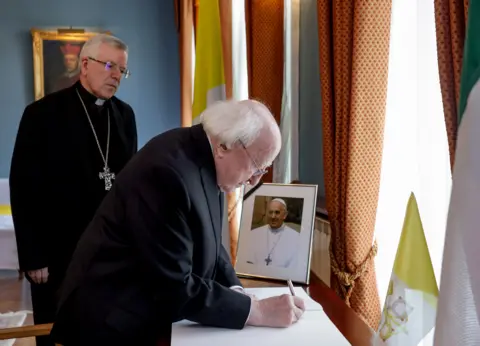 Tony Maxwell/Maxwells/PA Wire
Tony Maxwell/Maxwells/PA WireOn Tuesday, the Irish president said Pope Francis had "unfinished business" and that he hopes the next pope will build on the steps he was able to take during his tenure.
Michael D Higgins will be among world leaders and dignitaries to attend the funeral of Pope Francis this weekend, along with his wife, Sabina.
After signing a book of condolences in Dublin, President Higgins said that, on behalf of the people of Ireland, he thanked Pope Francis for his work and his example on "embracing the most important issues".
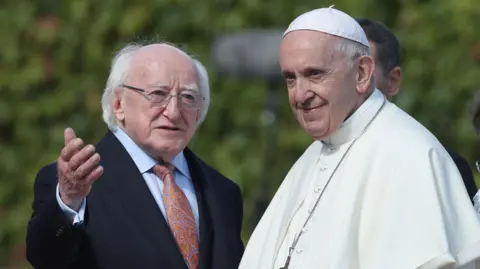 Danny Lawson/PA Wire
Danny Lawson/PA Wire"Issues that are at the future of our humanity together in relation to climate change, in relation to global poverty, in relation to his particular interest in the welfare of migrants," Higgins said.
"I thought of the times we have met and the discussions we had, his ability to embrace the suffering, particularly those who are marginalised.
"I noted in the way his vision was wider than many people in politics and public life."
The president described Pope Francis's visit to Ireland in August 2018 as a "very warm visit".
"We were all very, very pleased. I think I met him five times, and I value and appreciate all of those conversations," he added.
"But I know as I was signing on behalf of all of the people, there are people outside of the Catholic Church - really his stress was always on our shared humanity."
Requiem Mass to take place in Knock
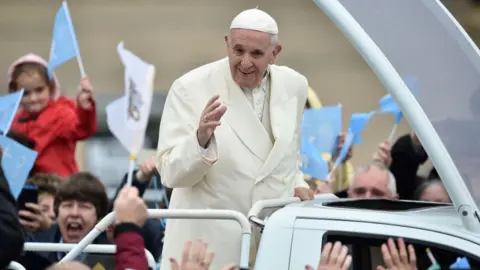 Getty Images
Getty ImagesMembers of the public have been paying tribute to Pope Francis at services across the island of Ireland.
On Wednesday, a special Requiem Mass will take place in Knock Basilica, County Mayo, at 19:30 local time.
Tens of thousands of people braved the heavy rain for a glimpse of Pope Francis when he visited the shrine in 2018.
During his visit to Knock, Pope Francis said no-one could fail to be moved by stories of those who "suffered abuse, were robbed of their innocence and left scarred by painful memories", and reiterated his wish to see justice served.
When celebrating Mass in Phoenix Park during the same visit, he listed a litany of different types of abuse and mistreatment inflicted on Irish people by Church figures, and the cover-ups of sex crimes.
On each occasion he asked for forgiveness, the congregation applauded.
Pope Francis followed in the footsteps of his predecessor, Pope John Paul II, who visited Dublin and Knock in September 1979.
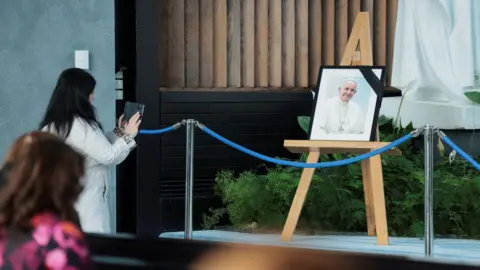 Reuters
ReutersWhat is special about Knock?
The Marian Shrine of Knock is a well-known place of Catholic pilgrimage in the west of Ireland.
An estimated 1.5 million pilgrims from across Ireland, and across the world, flock to the shrine every year to pray at the place where an apparition of Mary, the mother of Jesus Christ, is said to have appeared in August 1879.
Following the apparition, miraculous cures were reported. The first was that of Delia Gordon, a 12-year-old girl who had been deaf and suffered horrific pain.
It is said that her parents took her to the shrine where she knelt before the place where the apparition was seen. Her mother picked a piece of cement from the gable wall, blessed it and put it on her daughter's ear. The pain went immediately and she was no longer deaf.
Since the apparition, pilgrims have come to Knock in search of healing, reconciliation and peace. Some of them are praying for a cure.
